Information on the ECLAT Foundation
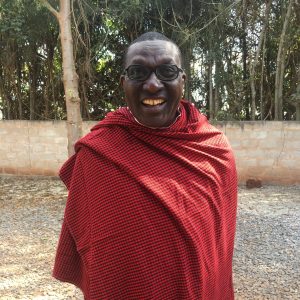
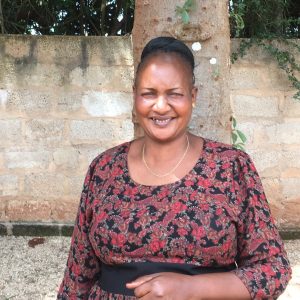 Toima and Philomena Kiroya went to the first primary school in the Simanjiro district in Emboreet, the “Simanjiro Primary School”, when they were small children. Emboreet is located in a very rural area in the Maasai steppe in the Simanjiro district – today about two hours’ drive from the city of Arusha. They later attended secondary school and Toima subsequently qualified as a teacher at university. Most of the other children did not go to school or hardly went at all. Even today, the illiteracy rate there is over 50%. After completing his education, Toima joined the government and became a District Commissioner in various parts of Tanzania.
Toima and Philomena Kiroya went to the first primary school in the Simanjiro district in Emboreet, the “Simanjiro Primary School”, when they were small children. Emboreet is located in a very rural area in the Maasai steppe in the Simanjiro district – today about two hours’ drive from the city of Arusha. They later attended secondary school and Toima subsequently qualified as a teacher at university. Most of the other children did not go to school or hardly went at all. Even today, the illiteracy rate there is over 50%. After completing his education, Toima joined the government and became a District Commissioner in various parts of Tanzania.
Toima and Philomena recognised the importance of education for social and personal development and remained connected to the people of the Maasai steppe. Together with friends, they founded an organisation, the ECLAT Foundation, to build a secondary school in their village, which until then had not existed in the area. They did not move to a big city, but remained loyal to their homeland and their fellow countrymen and lived in their home village of Emboreet.
More information can be found on the homepage of ECLAT: https://eclat-foundation.or.tz/
School education
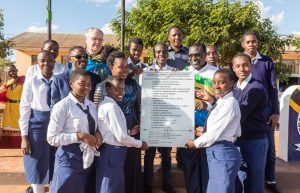 A good ten years ago, Toima and Philomena started to build a secondary school in Emboreet. To this end, they founded ECLAT and agreed a partnership with upendo. Since then, with the support of foundations and upendo’s circle of friends, a modern school has been built there in many stages of expansion, which has attracted attention with good pupil results and is very popular. Although the school was initially intended for just 320 children, today 800 children can be taught at the school. The school is equipped to a high standard with classrooms, science rooms, a library, and a computer centre. Like almost all secondary schools in the country, the one in Emboreet is a boarding school. The pupils’ families live far away and there are no bus or other transport options. For this reason, dormitories were built for girls and boys, as well as houses for the teaching staff. A well was drilled for the water supply and water tanks were built so that enough hygienically clean water is available for the many people on the school grounds. School meals are prepared for the pupils in the kitchen and they eat in the large multi-purpose hall, which is equipped with a video/audio system and can also be used for events. The school grounds have now been fenced in to protect them from wild animals and the final construction phase has been completed. All projects have been handed over to the Tanzanian government, which has assumed responsibility for running the school.
A good ten years ago, Toima and Philomena started to build a secondary school in Emboreet. To this end, they founded ECLAT and agreed a partnership with upendo. Since then, with the support of foundations and upendo’s circle of friends, a modern school has been built there in many stages of expansion, which has attracted attention with good pupil results and is very popular. Although the school was initially intended for just 320 children, today 800 children can be taught at the school. The school is equipped to a high standard with classrooms, science rooms, a library, and a computer centre. Like almost all secondary schools in the country, the one in Emboreet is a boarding school. The pupils’ families live far away and there are no bus or other transport options. For this reason, dormitories were built for girls and boys, as well as houses for the teaching staff. A well was drilled for the water supply and water tanks were built so that enough hygienically clean water is available for the many people on the school grounds. School meals are prepared for the pupils in the kitchen and they eat in the large multi-purpose hall, which is equipped with a video/audio system and can also be used for events. The school grounds have now been fenced in to protect them from wild animals and the final construction phase has been completed. All projects have been handed over to the Tanzanian government, which has assumed responsibility for running the school.
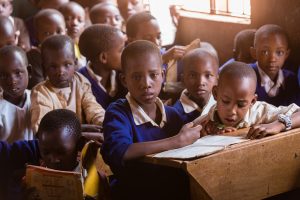 In addition to building the secondary school, ECLAT has also been able to support the education of Maasai children by building and expanding various primary schools. In Tanzania, the municipalities are responsible for building schools; the state then takes over the running of the schools, but does not have sufficient funds to build the many schools needed in the country. Particularly in remote and underdeveloped areas of the country, such as the Simanjiro district, the population is poor and the municipalities are unable to raise the funds to build schools, leaving them isolated from the country’s general development. Due to the small number of primary schools and the resulting long distances to school of often more than 10 kilometres, many children in these areas do not go to school. The existing schools often date back to the colonial era. Thanks to the renovation of such schools and the construction of new schools by ECLAT, many more children can go to school today than 10 years ago. While more than 70% of children in the district did not go to school back then, today the figure is significantly less than 30%. However, population growth also means that the number of children in a classroom is often over 60, sometimes even over 100, despite the new schools. By the end of 2023, ECLAT was able to renovate, expand or build 40 primary schools across the country thanks to financial support from foundations and the Friends of upendo. These schools were also handed over to the state, which is ultimately responsible for the education of children in the country and operates the schools.
In addition to building the secondary school, ECLAT has also been able to support the education of Maasai children by building and expanding various primary schools. In Tanzania, the municipalities are responsible for building schools; the state then takes over the running of the schools, but does not have sufficient funds to build the many schools needed in the country. Particularly in remote and underdeveloped areas of the country, such as the Simanjiro district, the population is poor and the municipalities are unable to raise the funds to build schools, leaving them isolated from the country’s general development. Due to the small number of primary schools and the resulting long distances to school of often more than 10 kilometres, many children in these areas do not go to school. The existing schools often date back to the colonial era. Thanks to the renovation of such schools and the construction of new schools by ECLAT, many more children can go to school today than 10 years ago. While more than 70% of children in the district did not go to school back then, today the figure is significantly less than 30%. However, population growth also means that the number of children in a classroom is often over 60, sometimes even over 100, despite the new schools. By the end of 2023, ECLAT was able to renovate, expand or build 40 primary schools across the country thanks to financial support from foundations and the Friends of upendo. These schools were also handed over to the state, which is ultimately responsible for the education of children in the country and operates the schools.
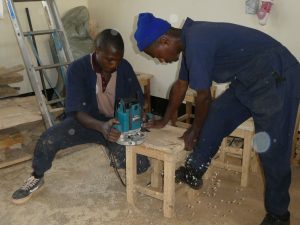 By building a training centre, ECLAT and upendo have also established vocational training in the Simanjiro district. This centre was also handed over to the state and young people from the district, both boys and girls, are now being trained as bricklayers, metalworkers or carpenters, as is typical for the country. ECLAT does not want all of them to migrate to the country’s major cities, but to set up start-ups in the district and contribute to the district’s economic development. ECLAT therefore supports the trainees during the final training phase and offers them counselling after they have completed their training.
By building a training centre, ECLAT and upendo have also established vocational training in the Simanjiro district. This centre was also handed over to the state and young people from the district, both boys and girls, are now being trained as bricklayers, metalworkers or carpenters, as is typical for the country. ECLAT does not want all of them to migrate to the country’s major cities, but to set up start-ups in the district and contribute to the district’s economic development. ECLAT therefore supports the trainees during the final training phase and offers them counselling after they have completed their training.
Women’s work
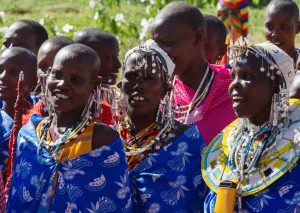 Philomena and Toima have remained true to their dream of showing their own ethnic group, the Maasai, a way out of their seemingly hopeless isolation and backwardness. Philomena became involved in women’s work early on. In 2011, they were awarded the Belgian Harubuntu Prize in Brussels in recognition of their efforts and as encouragement not to give up. Staying in her homeland was also important for Philomena because she wanted to improve the position of women in Maasai society. Initially with the financial support of the Belgian embassy, she founded women’s groups, which she supervises – a task that no European, no matter how well educated, no man or woman from another ethnic group could fulfil. Thanks to financial support from foundations and the Friends of upendo, Philomena has been able to expand this work since 2014. Because she lives locally in her home village, she is closely connected to the Maasai culture and the local population. Just ten years ago, Maasai women were not allowed to meet without their husbands’ consent and all financial resources belonged to their husbands, making them financially dependent on their husbands, who often have several wives and are unable to provide adequately for their many children. Thanks to the commitment of ECLAT, this has changed noticeably in recent years with careful, sensitive, and continuous work. Meetings of women’s groups are now a matter of course and their economic commitment is accepted. This is visible everywhere in the villages.
Philomena and Toima have remained true to their dream of showing their own ethnic group, the Maasai, a way out of their seemingly hopeless isolation and backwardness. Philomena became involved in women’s work early on. In 2011, they were awarded the Belgian Harubuntu Prize in Brussels in recognition of their efforts and as encouragement not to give up. Staying in her homeland was also important for Philomena because she wanted to improve the position of women in Maasai society. Initially with the financial support of the Belgian embassy, she founded women’s groups, which she supervises – a task that no European, no matter how well educated, no man or woman from another ethnic group could fulfil. Thanks to financial support from foundations and the Friends of upendo, Philomena has been able to expand this work since 2014. Because she lives locally in her home village, she is closely connected to the Maasai culture and the local population. Just ten years ago, Maasai women were not allowed to meet without their husbands’ consent and all financial resources belonged to their husbands, making them financially dependent on their husbands, who often have several wives and are unable to provide adequately for their many children. Thanks to the commitment of ECLAT, this has changed noticeably in recent years with careful, sensitive, and continuous work. Meetings of women’s groups are now a matter of course and their economic commitment is accepted. This is visible everywhere in the villages.
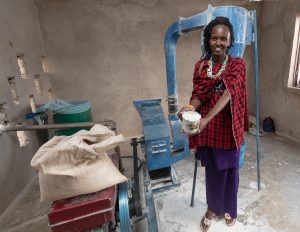 The women’s centre built by ECLAT in 2017 has made a significant contribution to this development. Women’s groups with up to 30 members meet here in weekly courses. They are taught the basics of hygiene, childcare and education, the necessity, and possibilities of family planning, as well as how to earn their own income by producing and marketing liquid soap or growing vegetables and raising chickens. It is now socially accepted that many women earn their own income – and the men recognise that they and their children also benefit from this.
The women’s centre built by ECLAT in 2017 has made a significant contribution to this development. Women’s groups with up to 30 members meet here in weekly courses. They are taught the basics of hygiene, childcare and education, the necessity, and possibilities of family planning, as well as how to earn their own income by producing and marketing liquid soap or growing vegetables and raising chickens. It is now socially accepted that many women earn their own income – and the men recognise that they and their children also benefit from this.
Teenage girls
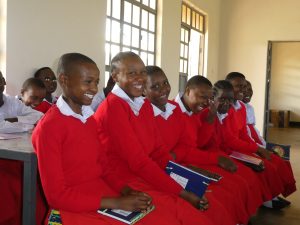 Since 2023, the women’s work has been complemented by a new pioneering project for teenage girls – thanks to funding from foundations and upendo’s circle of friends. Primary school education in Tanzania lasts seven years. Many of the girls (and boys) do not qualify for secondary school afterwards. The girls are then often married off at the age of 15 in accordance with Maasai tradition. Some of the girls who attend secondary school after primary school also drop out after two or four years. ECLAT offers these girls between the ages of 15 and 20 a craft apprenticeship as an alternative to marriage. The demand for training places is high and the girls are enthusiastic about the programme, grateful for the new life prospects it offers. In a two-year course, they are taught knowledge and skills in tailoring and food preparation, which will enable them to become more independent later in life and earn their own living.
Since 2023, the women’s work has been complemented by a new pioneering project for teenage girls – thanks to funding from foundations and upendo’s circle of friends. Primary school education in Tanzania lasts seven years. Many of the girls (and boys) do not qualify for secondary school afterwards. The girls are then often married off at the age of 15 in accordance with Maasai tradition. Some of the girls who attend secondary school after primary school also drop out after two or four years. ECLAT offers these girls between the ages of 15 and 20 a craft apprenticeship as an alternative to marriage. The demand for training places is high and the girls are enthusiastic about the programme, grateful for the new life prospects it offers. In a two-year course, they are taught knowledge and skills in tailoring and food preparation, which will enable them to become more independent later in life and earn their own living.
Water projects
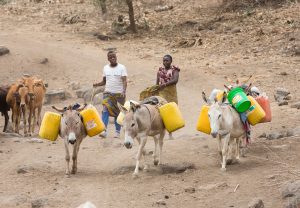 A good and reliable supply of clean drinking water is a fundamental human right. In an environment as arid as the Maasai steppe, people experience this necessity all the more clearly, especially during the long dry season of around eight months. Apart from the few reservoirs, there is almost no surface water at this time of year; and the water that is available is polluted and contaminated with germs. The groundwater table, however, is a hundred metres below the surface. The women and girls have to walk correspondingly far to fetch water, often 10 or 20 kilometres away. Fetching water is a woman’s job. However, the germs in the water cause many illnesses, especially among the children. Thanks to the support of foundations, companies, and the circle of friends of upendo, ECLAT has been able to build water filtration systems at some of these reservoirs so that the population there has hygienically clean drinking water. In other places, ECLAT was able to drill groundwater wells. There, people can draw hygienically clean water for themselves and their families.
A good and reliable supply of clean drinking water is a fundamental human right. In an environment as arid as the Maasai steppe, people experience this necessity all the more clearly, especially during the long dry season of around eight months. Apart from the few reservoirs, there is almost no surface water at this time of year; and the water that is available is polluted and contaminated with germs. The groundwater table, however, is a hundred metres below the surface. The women and girls have to walk correspondingly far to fetch water, often 10 or 20 kilometres away. Fetching water is a woman’s job. However, the germs in the water cause many illnesses, especially among the children. Thanks to the support of foundations, companies, and the circle of friends of upendo, ECLAT has been able to build water filtration systems at some of these reservoirs so that the population there has hygienically clean drinking water. In other places, ECLAT was able to drill groundwater wells. There, people can draw hygienically clean water for themselves and their families.
Family planning
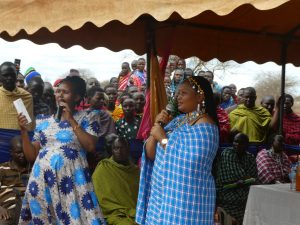 The Maasai population is currently doubling in less than 20 years. Their economic performance depends on their cattle, but the number of cattle cannot be increased at will. Overgrazing and entire herds dying of thirst are a reality. As a result, the Maasai are impoverished and are increasingly losing touch with the country’s general development. However, poverty is closely linked to a lack of education – and in the Simanjiro district, more than 50 % of the people are illiterate.
The Maasai population is currently doubling in less than 20 years. Their economic performance depends on their cattle, but the number of cattle cannot be increased at will. Overgrazing and entire herds dying of thirst are a reality. As a result, the Maasai are impoverished and are increasingly losing touch with the country’s general development. However, poverty is closely linked to a lack of education – and in the Simanjiro district, more than 50 % of the people are illiterate.
In Maasai culture, the men are proud of their large number of children, even if they do not look after them themselves. Raising the children is the responsibility of the women, who are barely able to feed and care for their many children. This is why ECLAT has been running family planning campaigns in the villages since 2022, which are primarily aimed at men. ECLAT carries out these campaigns together with the traditional leaders who support our appeal. As the state provides family planning resources free of charge, ECLAT also works with the health centres. Couples can obtain family planning resources there. The campaigns are very well received. Many seek counselling and contraceptive treatment. More and more villages are approaching ECLAT to organise family planning campaigns for them too.
